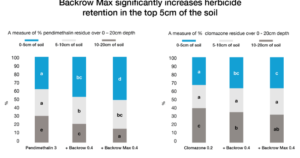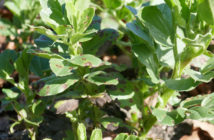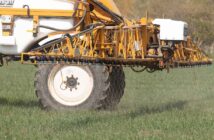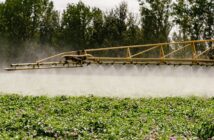A new residual herbicide from Interagro has been approved by the Chemicals Regulation Division (CRD), increasing the options for growers looking to tackle grassweeds.
The efficacy of grassweed herbicides has been under pressure for some time, exacerbated by the prevalence of particularly persistent weeds, like blackgrass.
However, a newly approved residual herbicide adjuvant, Backrow Max – from the adjuvant experts, Interagro – could be a crucial tool for growers this autumn.
Backrow Max is a step-on from the UK’s leading residual herbicide adjuvant Backrow, and offers real practical benefits to growers, explains Stuart Sutherland, technical manager at Interagro.
“It makes herbicide applications more targeted, enhancing herbicide coverage and deposition across the soil which is essential to maximise contact with germinating weeds.
Benefit of 9% black-grass control
“Backrow trials over the past decade show an average benefit of 9% blackgrass control with a wide range of different residuals. Weed control with Backrow Max is at least as effective as Backrow – confirmed in four years of trials.
“Backrow Max also has a cleaner label, with no hazard statements on the label, so it is better for the environment too.”
As well as this, Mr Sutherland says one of the biggest advantages of Backrow Max is its ability to stay in place in wet soils. “Independent research has shown that it provides even stronger herbicide retention in the top 5cm of the soil following heavy rainfall.
“Crucially for growers, it ensures herbicide concentration in the weed zone is sufficiently lethal and it keeps it there for longer, helping to control subsequent flushes of weeds.”
This could be particularly useful if autumn months remain wetter than usual, he adds. “Met Office data looking back to 2015 shows that Octobers are becoming wetter. So while delayed drilling reduces the overall amount of black-grass likely to germinate with the crop, the wetter weather is becoming more of a threat to herbicide performance too.
“As all pre-ems are mobile – the extent to which depends on their chemical properties and soil type – they all often require additional support from an effective adjuvant to keep them in the weed germination zone in wet soils, and especially light soils.”
In 2021, researchers at the Institute of Soil Science and Plant Cultivation in Poland concluded that even pendimethalin can move in wet soils.
“The study also showed that adjuvants can have a varying influence on the ability to keep it in place, but Interagro’s original Backrow product came out on top,” says Mr Sutherland.
This year, further research showed Backrow Max’s performance to be even more superior – significantly increasing the retention of both pendimethalin and clomazone, he adds.

As well as better weed control, keeping herbicides in place is also beneficial from a crop and water safety perspective, adds Mr Sutherland.
“Leaching research conducted in The Netherlands has previously shown that Backrow can reduce chemical leaching by >60%. Given Backrow Max offers even stronger retention in wet soils, it’s the perfect safety net for growers who will be spraying their fields this autumn.”
On dry soils, Backrow Max has also been proven to increase weed control by as much as 20%. “While the autumn months look set to become wetter, spring is looking drier – with Met Office records showing lower rainfall in April and May,” explains Mr Sutherland.
“Therefore, Backrow Max is as valuable an addition to pre- and peri-emergence applications in the spring as it is in the autumn.
“With some spring crops there are very few, if any post-emergence herbicides available, so getting the most from pre-em applications is crucial. Backrow Max is approved for use in an extensive list of crops, including vegetables, so it really is worth considering given the benefits.”
For more information on Backrow Max, visit: https://www.interagro.co.uk/product/backrow-max/




